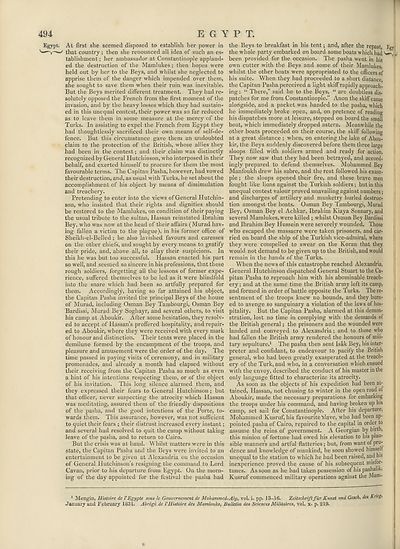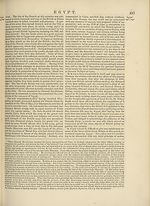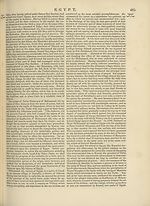Encyclopaedia Britannica > Volume 8, DIA-England
(504) Page 494
Download files
Complete book:
Individual page:
Thumbnail gallery: Grid view | List view

EGYPT.
494
Egypt. At first she seemed disposed to establish her power in
that country ; then she renounced all idea of such an es¬
tablishment ; her ambassador at Constantinople applaud¬
ed the destruction of the Mamlukes ; then hopes were
held out by her to the Beys, and whilst she neglected to
apprise them of the danger which impended over them,
she sought to save them when their ruin was inevitable.
But the Beys merited different treatment. They had re¬
solutely opposed the French from the first moment of the
invasion, and by the heavy losses which they had sustain¬
ed in this unequal contest, their power was so far reduced
as to leave them in some measure at the mercy of the
Turks. In assisting to expel the French from Egypt they
had thoughtlessly sacrificed their own means of self-de¬
fence. But this circumstance gave them an undoubted
claim to the protection of the British, whose allies they
had been in the contest; and their claim was distinctly
recognized by General Hutchinson, who interposed in their
behalf, and exerted himself to procure for them the most
favourable terms. The Capitan Pasha, however, had vowed
their destruction, and, as usual with Turks, he set about the
accomplishment of his object by means of dissimulation
and treachery.
Pretending to enter into the views of General Hutchin¬
son, who insisted that their rights and dignities should
be restored to the Mamlukes, on condition of their paying
the usual tribute to the sultan, Hassan reinstated Ibrahim
Bey, who was now at the head of their affairs (Murad hav¬
ing fallen a victim to the plague), in his former office of
Sheikh-el-Belled ; he also lavished favours and caresses
on the other chiefs, and sought by every means to gratify
their pride, and, above all, to allay their suspicions. In
this he was but too successful. Hassan enacted his part
so well, and seemed so sincere in his professions, that these
rough soldiers, forgetting all the lessons of former expe¬
rience, suffered themselves to be led as it were blindfold
into the snare which had been so artfully prepared for
them. Accordingly, having so far attained his object,
the Capitan Pasha invited the principal Beys of the house
of Murad, including Osman Bey Tambourgi, Osman Bey
Bardissi, Murad Bey Soghayr, and several others, to visit
his camp at Aboukir. After some hesitation, they resolv¬
ed to accept of Hassan’s proffered hospitality, and repair¬
ed to Aboukir, where they were received with every mark
of honour and distinction. Their tents were placed in the
demilune formed by the encampment of the troops, and
pleasure and amusement were the order of the day. The
time passed in paying visits of ceremony, and in military
promenades, and already a month had elapsed without
their receiving from the Capitan Pasha so much as even
a hint of his intentions respecting them, or of the object
of his invitation. This long silence alarmed them, and
they expressed their fears to General Hutchinson ; but
that officer, never suspecting the atrocity which Hassan
was meditating, assured them of the friendly dispositions
of the pasha, and the good intentions of the Porte, to¬
wards them. This assurance, however, was not sufficient
to quiet their fears ; their distrust increased every instant;
and several had resolved to quit the camp without taking
leave of the pasha, and to return to Cairo.
But the crisis was at hand. Whilst matters were in this
state, the Capitan Pasha and the Beys were invited to an
entertainment to be given at Alexandria on the occasion
of General Hutchinson’s resigning the command to Lord
Cavan, prior to his departure from Egypt. On the morn¬
ing of the day appointed for the festival the pasha had
the Beys to breakfast in his tent; and, after the repast, Egy
the whole party embarked on board some boats which had w)
been provided for the occasion. The pasha went in his
own cutter with the Beys and some of their Mamlukes,
whilst the other boats were appropriated to the officers of
his suite. When they had proceeded to a short distance,
the Capitan Pasha perceived a light skiff rapidly approach¬
ing : “ There,” said he to the Beys, “ are doubtless dis¬
patches for me from Constantinople.” Anon the skiff came
alongside, and a packet was handed to the pasha, which
he immediately broke open, and, on pretence of reading
his dispatches more at leisure, stepped on board the small
boat, which immediately dropped astern. Meanwhile the
other boats proceeded on their course, the skiff following
at a great distance ; when, on entering the lake of Abou¬
kir, the Beys suddenly discovered before them three large
sloops filled with soldiers armed and ready for action.
They now saw that they had been betrayed, and accord¬
ingly prepared to defend themselves. Mohammed Bey
Manfoukh drew his sabre, and the rest followed his exam¬
ple ; the sloops opened their fire, and these brave men
fought like lions against the Turkish soldiers ; but in this
unequal contest valour proved unavailing against numbers;
and discharges of artillery and musketry hurled destruc¬
tion amongst the boats. Osman Bey Tambourgi, Murad
Bey, Osman Bey el Achkar, Ibrahim Kiaya Sennary, and
several Mamlukes, were killed ; whilst Osman Bey Bardissi
and Ibrahim Bey Hussein w ere severely wounded. Those
who escaped the massacre were taken prisoners, and car¬
ried on board the ship of the Turkish vice-admiral, where
they were compelled to swear on the Koran that they
would not demand to be given up to the British, and would
remain in the hands of the Turks.
When the newrs of this catastrophe reached Alexandria,
General Hutchinson dispatched General Stuart to the Ca¬
pitan Pasha to reproach him with his abominable treach¬
ery ; and at the same time the British army left its camp,
and formed in order of battle opposite the Turks. The re¬
sentment of the troops knew no bounds, and they burn¬
ed to avenge so sanguinary a violation of the laws of hos¬
pitality. But the Capitan Pasha, alarmed at this demon¬
stration, lost no time in complying with the demands of
the British general; the prisoners and the wounded were
landed and conveyed to Alexandria; and to those who
had fallen the British army rendered the honours of mili¬
tary sepulture.1 The pasha then sent Isak Bey, his inter¬
preter and confidant, to endeavour to pacify the British
general, who had been greatly exasperated at the treach¬
ery of the Turk, and who, in a conversation which ensued
with the envoy, described the conduct of his master in the
only language fitted to characterize its atrocity.
As soon as the objects of his expedition had been at¬
tained, Hassan, not chusing to winter in the open road of
Aboukir, made the necessary preparations for embarking
the troops under his command, and having broken up his
camp, set sail for Constantinople. After his departure,
Mohammed Kusruf, his favourite *slave, who had been ap¬
pointed pasha of Cairo, repaired to the capital in order to
assume the reins of government. A Georgian by birth,
this minion of fortune had owred his elevation to his plau¬
sible manner’s and artful flatteries; but, from want of pru¬
dence and knowledge of mankind, he soon showed himself
unequal to the station to which he had been raised, and his
inexperience proved the cause of his subsequent misfor¬
tunes. As soon as he had taken possession of his pashahk,
Kusruf commenced military operations against the Mam-
1 Mengin, Histoire de I'Egypte sous le Gouvernemcnt de Mohammed-Aly, vol. i. pp. 13-16. Zeitschriftfur Kunst und Gesch. da Kricg-
January and February 1331. Abrege de VHistoire des Mamlottks, Bulletin des Sciences Militaires, vol. x- p. 219.
494
Egypt. At first she seemed disposed to establish her power in
that country ; then she renounced all idea of such an es¬
tablishment ; her ambassador at Constantinople applaud¬
ed the destruction of the Mamlukes ; then hopes were
held out by her to the Beys, and whilst she neglected to
apprise them of the danger which impended over them,
she sought to save them when their ruin was inevitable.
But the Beys merited different treatment. They had re¬
solutely opposed the French from the first moment of the
invasion, and by the heavy losses which they had sustain¬
ed in this unequal contest, their power was so far reduced
as to leave them in some measure at the mercy of the
Turks. In assisting to expel the French from Egypt they
had thoughtlessly sacrificed their own means of self-de¬
fence. But this circumstance gave them an undoubted
claim to the protection of the British, whose allies they
had been in the contest; and their claim was distinctly
recognized by General Hutchinson, who interposed in their
behalf, and exerted himself to procure for them the most
favourable terms. The Capitan Pasha, however, had vowed
their destruction, and, as usual with Turks, he set about the
accomplishment of his object by means of dissimulation
and treachery.
Pretending to enter into the views of General Hutchin¬
son, who insisted that their rights and dignities should
be restored to the Mamlukes, on condition of their paying
the usual tribute to the sultan, Hassan reinstated Ibrahim
Bey, who was now at the head of their affairs (Murad hav¬
ing fallen a victim to the plague), in his former office of
Sheikh-el-Belled ; he also lavished favours and caresses
on the other chiefs, and sought by every means to gratify
their pride, and, above all, to allay their suspicions. In
this he was but too successful. Hassan enacted his part
so well, and seemed so sincere in his professions, that these
rough soldiers, forgetting all the lessons of former expe¬
rience, suffered themselves to be led as it were blindfold
into the snare which had been so artfully prepared for
them. Accordingly, having so far attained his object,
the Capitan Pasha invited the principal Beys of the house
of Murad, including Osman Bey Tambourgi, Osman Bey
Bardissi, Murad Bey Soghayr, and several others, to visit
his camp at Aboukir. After some hesitation, they resolv¬
ed to accept of Hassan’s proffered hospitality, and repair¬
ed to Aboukir, where they were received with every mark
of honour and distinction. Their tents were placed in the
demilune formed by the encampment of the troops, and
pleasure and amusement were the order of the day. The
time passed in paying visits of ceremony, and in military
promenades, and already a month had elapsed without
their receiving from the Capitan Pasha so much as even
a hint of his intentions respecting them, or of the object
of his invitation. This long silence alarmed them, and
they expressed their fears to General Hutchinson ; but
that officer, never suspecting the atrocity which Hassan
was meditating, assured them of the friendly dispositions
of the pasha, and the good intentions of the Porte, to¬
wards them. This assurance, however, was not sufficient
to quiet their fears ; their distrust increased every instant;
and several had resolved to quit the camp without taking
leave of the pasha, and to return to Cairo.
But the crisis was at hand. Whilst matters were in this
state, the Capitan Pasha and the Beys were invited to an
entertainment to be given at Alexandria on the occasion
of General Hutchinson’s resigning the command to Lord
Cavan, prior to his departure from Egypt. On the morn¬
ing of the day appointed for the festival the pasha had
the Beys to breakfast in his tent; and, after the repast, Egy
the whole party embarked on board some boats which had w)
been provided for the occasion. The pasha went in his
own cutter with the Beys and some of their Mamlukes,
whilst the other boats were appropriated to the officers of
his suite. When they had proceeded to a short distance,
the Capitan Pasha perceived a light skiff rapidly approach¬
ing : “ There,” said he to the Beys, “ are doubtless dis¬
patches for me from Constantinople.” Anon the skiff came
alongside, and a packet was handed to the pasha, which
he immediately broke open, and, on pretence of reading
his dispatches more at leisure, stepped on board the small
boat, which immediately dropped astern. Meanwhile the
other boats proceeded on their course, the skiff following
at a great distance ; when, on entering the lake of Abou¬
kir, the Beys suddenly discovered before them three large
sloops filled with soldiers armed and ready for action.
They now saw that they had been betrayed, and accord¬
ingly prepared to defend themselves. Mohammed Bey
Manfoukh drew his sabre, and the rest followed his exam¬
ple ; the sloops opened their fire, and these brave men
fought like lions against the Turkish soldiers ; but in this
unequal contest valour proved unavailing against numbers;
and discharges of artillery and musketry hurled destruc¬
tion amongst the boats. Osman Bey Tambourgi, Murad
Bey, Osman Bey el Achkar, Ibrahim Kiaya Sennary, and
several Mamlukes, were killed ; whilst Osman Bey Bardissi
and Ibrahim Bey Hussein w ere severely wounded. Those
who escaped the massacre were taken prisoners, and car¬
ried on board the ship of the Turkish vice-admiral, where
they were compelled to swear on the Koran that they
would not demand to be given up to the British, and would
remain in the hands of the Turks.
When the newrs of this catastrophe reached Alexandria,
General Hutchinson dispatched General Stuart to the Ca¬
pitan Pasha to reproach him with his abominable treach¬
ery ; and at the same time the British army left its camp,
and formed in order of battle opposite the Turks. The re¬
sentment of the troops knew no bounds, and they burn¬
ed to avenge so sanguinary a violation of the laws of hos¬
pitality. But the Capitan Pasha, alarmed at this demon¬
stration, lost no time in complying with the demands of
the British general; the prisoners and the wounded were
landed and conveyed to Alexandria; and to those who
had fallen the British army rendered the honours of mili¬
tary sepulture.1 The pasha then sent Isak Bey, his inter¬
preter and confidant, to endeavour to pacify the British
general, who had been greatly exasperated at the treach¬
ery of the Turk, and who, in a conversation which ensued
with the envoy, described the conduct of his master in the
only language fitted to characterize its atrocity.
As soon as the objects of his expedition had been at¬
tained, Hassan, not chusing to winter in the open road of
Aboukir, made the necessary preparations for embarking
the troops under his command, and having broken up his
camp, set sail for Constantinople. After his departure,
Mohammed Kusruf, his favourite *slave, who had been ap¬
pointed pasha of Cairo, repaired to the capital in order to
assume the reins of government. A Georgian by birth,
this minion of fortune had owred his elevation to his plau¬
sible manner’s and artful flatteries; but, from want of pru¬
dence and knowledge of mankind, he soon showed himself
unequal to the station to which he had been raised, and his
inexperience proved the cause of his subsequent misfor¬
tunes. As soon as he had taken possession of his pashahk,
Kusruf commenced military operations against the Mam-
1 Mengin, Histoire de I'Egypte sous le Gouvernemcnt de Mohammed-Aly, vol. i. pp. 13-16. Zeitschriftfur Kunst und Gesch. da Kricg-
January and February 1331. Abrege de VHistoire des Mamlottks, Bulletin des Sciences Militaires, vol. x- p. 219.
Set display mode to:
![]() Universal Viewer |
Universal Viewer | ![]() Mirador |
Large image | Transcription
Mirador |
Large image | Transcription
Images and transcriptions on this page, including medium image downloads, may be used under the Creative Commons Attribution 4.0 International Licence unless otherwise stated. ![]()
| Encyclopaedia Britannica > Encyclopaedia Britannica > Volume 8, DIA-England > (504) Page 494 |
|---|
| Permanent URL | https://digital.nls.uk/193329557 |
|---|
| Attribution and copyright: |
|
|---|
| Description | Ten editions of 'Encyclopaedia Britannica', issued from 1768-1903, in 231 volumes. Originally issued in 100 weekly parts (3 volumes) between 1768 and 1771 by publishers: Colin Macfarquhar and Andrew Bell (Edinburgh); editor: William Smellie: engraver: Andrew Bell. Expanded editions in the 19th century featured more volumes and contributions from leading experts in their fields. Managed and published in Edinburgh up to the 9th edition (25 volumes, from 1875-1889); the 10th edition (1902-1903) re-issued the 9th edition, with 11 supplementary volumes. |
|---|---|
| Additional NLS resources: |
|

